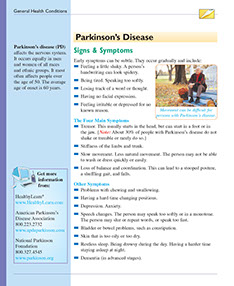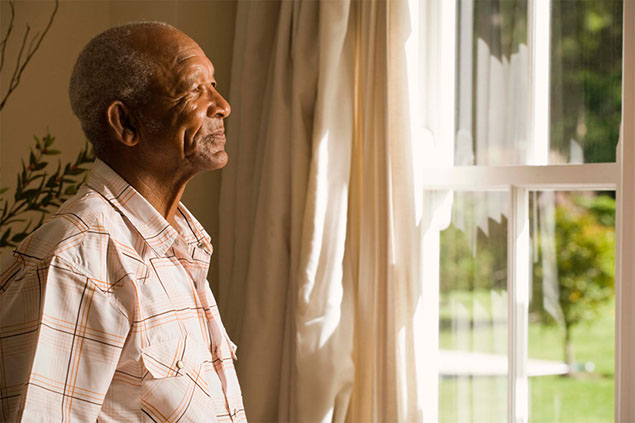CONDITIONS
SYMPTOM CHECKER
Male
Female
Child
Arm, Hand & Shoulder Concerns
Legs & Feet Concerns
Dental & Mouth Concerns
Ear & Nose
Eye Conditions
Head Conditions
Arm, Hand & Shoulder Concerns
Legs & Feet Concerns
Front
Back
Arm, Hand & Shoulder Concerns
Dental & Mouth Concerns
Ear & Nose
Eye Conditions
Head Conditions
Arm, Hand & Shoulder Concerns
Dental & Mouth Concerns
Ear & Nose
Eye Conditions
Head Conditions
Front
Back
Arm, Hand & Shoulder Concerns
Neck Links
Head & Neck Concerns
Arm, Hand & Shoulder Concerns
Neck Links
Head & Neck Concerns
Front
Back
Online Clinic
Wise Healthcare
Parkinson’s Disease
Print on Demand
RELATED ARTICLES
Parkinson’s disease (PD) affects the nervous system. It occurs equally in men and women of all races and ethnic groups. It most often affects people over the age of 50. The average age of onset is 60 years.
Alzheimer's Disease
Signs & Symptoms
Early symptoms can be subtle. They occur gradually and include:
• Feeling a little shaky. A person’s handwriting can look spidery.
• Being tired. Speaking too softly.
• Losing track of a word or thought.
• Having no facial expression.
• Feeling irritable or depressed for no known reason.
The Four Main Symptoms
• Tremor. This may start in the hand while at rest, but can start in the head or leg. Tremor is not always present.
• Stiffness of the limbs and trunk.
• Slow movement. Less natural movement. The person may not be able to wash or dress quickly or easily.
• Loss of balance and coordination. This can lead to a stooped posture, a shuffling gait, and falls.
Other Symptoms
• Problems with chewing and swallowing.
• Having a hard time changing positions.
• Depression. Anxiety.
• Speech changes. The person may speak too softly or in a monotone. The person may slur or repeat words, or speak too fast.
• Bladder or bowel problems, such as constipation.
• Skin that is too oily or too dry.
• Restless sleep. Being drowsy during the day. Having a harder time staying asleep at night.
• Dementia (in advanced stages).
Causes
The exact cause of Parkinson’s disease is not known. What is known, though, is that certain cells in the lower part of the brain can’t produce dopamine. Nerves need this to coordinate body movement.
{Note: Some medicines can bring on symptoms like ones of Parkinson’s disease. Examples are strong tranquilizers and metoclopramide (Reglan), a drug used for some digestive problems.}
Risk Factors
• Family history of the disease.
• Aging. For some persons, the neurons that produce dopamine wear away with aging.
• Rarely, repeated trauma to the head. This can happen to boxers. Muhammad Ali has this condition.
• Damage to nerve cells through a chemical process called oxidation.
• Toxins in the environment.
Treatment
Parkinson’s disease is not yet curable. Symptoms can be relieved or controlled. Treatment includes:
• Medicines, such as levodopa, selegiline, and apomorphine.
• Physical therapy. Speech therapy.
• Direct electrical brain stimulation.
• Neurosurgery.
Questions to Ask
Question 1
Are one or more signs and symptoms of Parkinson’s disease listed on this page present?
You should be seen by your doctor for medical advice. Contact your doctor or health care provider to find out how soon you should be seen.
Question 2
Does a person with Parkinson’s disease have either of these problems?
• Bothersome side effects from medicines.
• New, unexpected symptoms occur during treatment.
You should be seen by your doctor for medical advice. Contact your doctor or health care provider to find out how soon you should be seen.
Use Self-Care / Prevention:
You can probably take care of the problem yourself if you answered NO to all the questions. Use the “Self-Care” measures that are listed. Call your doctor if you don’t feel better soon, though. You may have some other problem.
Self-Care / Prevention
• Follow your treatment plan.
• Plan and maintain safety in the home. Replace razor blades with electric shavers. Use nonskid rugs and handrails to prevent falls, etc.
• Make tasks easy to do. Wear loafers, not tie shoes. Wear clothes that can be pulled on. Use items with snaps or Velcro closures instead of buttons.
• Prevent constipation.
• Stay as active as you can. Do the activities and exercises advised by your doctor and/or physical therapist.
• Take warm baths. Get massages to help with rigid muscles.
• Eat healthy foods. If you take levodopa, limit the protein in your diet, as advised by your doctor. A high protein diet can lessen the effects of levodopa.
This website is not meant to substitute for expert medical advice or treatment. Follow your doctor’s or health care provider’s advice if it differs from what is given in this guide.
The American Institute for Preventive Medicine (AIPM) is not responsible for the availability or content of external sites, nor does AIPM endorse them. Also, it is the responsibility of the user to examine the copyright and licensing restrictions of external pages and to secure all necessary permission.
The content on this website is proprietary. You may not modify, copy, reproduce, republish, upload, post, transmit, or distribute, in any manner, the material on the website without the written permission of AIPM.
2021 © American Institute for Preventive Medicine - All Rights Reserved. Disclaimer | www.HealthyLife.com
















































